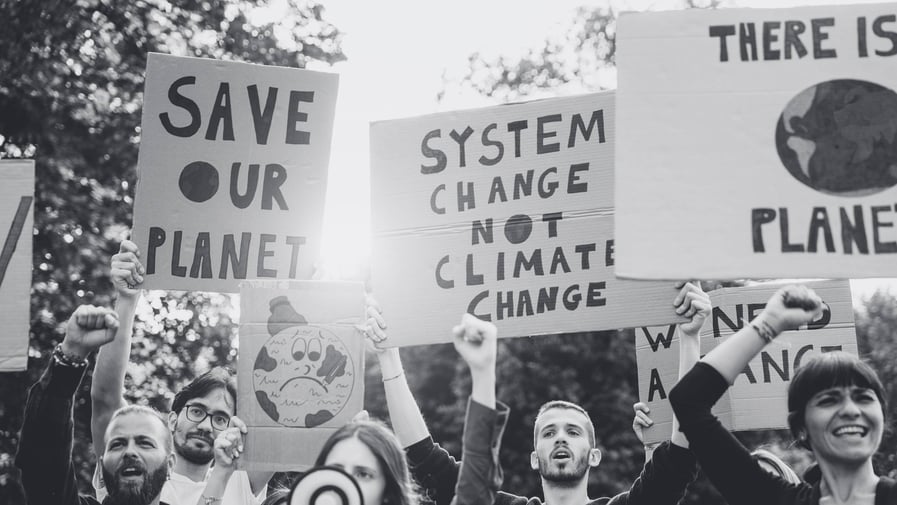While increased global engagement with combating climate change and other environmental issues has driven governments and organisations to adopt more responsible commercial practices, activists continue to target those falling short. Yet, the emerging conflict between competing environmental, community and industry goals is set to spur tensions and spark further unrest in 2024, write Erin Drake and Shannon Lorimer.
Efforts to adopt more responsible practices regarding the impact of industry and business on the environment have accelerated in recent years. But, as governments and international bodies increasingly regulate and legislate this space amid activist demands, growing opposition to the realities of the energy transition are increasingly apparent. In the coming year, industries and governments alike will need to navigate growing competition between reaching environmental targets, and satisfy worker, shareholder and citizen demands more broadly. Missteps or perceived inaction could drive public backlash, leaving the public and private sectors more vulnerable to civil unrest in 2024.
Environmental and community activism escalates
Environmental activism has increased by around seven percent since 2022, with some 2,922 incidents reported globally in 2023. Climate-related protests remained most prevalent, with activist groups in this space becoming increasingly coordinated. Although most protests comprised peaceful marches in cities, groups like JustStopOil and Letzte Generation have escalated efforts to disrupt business and transport systems, targeting companies, sporting events, and infrastructure. In May 2023 for example, London activists stormed an energy giant’s annual shareholder meeting, clashing with security personnel, while Greenpeace
protesters harangued the South African Energy Minister’s address at the Africa Energy Indaba in Cape Town. In September 2023, activists further blockaded the Federal Reserve Bank in New York to reject fossil fuel funding, and in November 2023, 300 Rising Tide activists obstructed shipping channels at Australia’s largest coal port. In a similar vein, Letzte Generation protesters have regularly blockaded airports in Berlin, Düsseldorf and Hamburg as part of their protest campaign.
Meanwhile, community activism has escalated in the mining and energy industries, with incidents nearly doubling between 2022 and 2023. The sectors face ongoing resistance among local and indigenous communities who reject the environmental and consequent social impact of extractive operations, including health concerns, forced resettlement, and perceived lapses in social investment commitments by foreign operators. Activists in Peru forced regular suspensions of operations at the Las Bambas copper mine, prompting the withdrawal of an Australian company in April 2023, while energy projects in Namibia and Zimbabwe have been subject to protests over working conditions and the alleged exploitation of migrant workers. With many of these issues unresolved, such protests are set to continue into 2024.
Authorities crack down on disruptive tactics
Amid escalations in the frequency and disruptive nature of climate activism, some governments, including Germany, New Zealand, Australia, the US, and UK, have intensified efforts to suppress protest efforts, carrying out mass arrests and labelling demonstrators as ‘eco-terrorists.’ In response, Extinction Rebellion (XR) has paused disruptive campaigns over fears of fines and jailtime. Yet, other climate groups have largely ignored this, echoing criticism from human rights groups like Amnesty International on the implications of such moves for democratic values. While some protesters may be deterred, it is likely that such crackdowns will strengthen resolve among certain groups, driving threats of further action in the coming year.
Difficult trade-offs
Yet, as climate and environmental activists push ahead with their demands, fast-tracking environmental and cleaner energy goals has faced resistance elsewhere. Some actors continue to perceive the transition as a threat to job security, or as likely to negatively impact economic growth and business activities for the communities they are set to serve. Between September and October 2023 for example, coal workers in Bulgaria blocked roads as part of protests to demand the government scale back carbon emission targets by 2026; these forced Prime Minister Nikolay Denkov to agree to keep coal plants operational until 2038. Meanwhile, in the US, the shift towards electric vehicles (EVs) has driven fears of layoffs among car manufacturers.
64 anti-mining protests targeting commercial operators and government initiatives reported in Sub-Saharan Africa in 2023
8% increase in climate-related unrest across Europe and North America since 2022
Europe recorded the most disruptive and violent climate protests
285 protests reported in Asia Pacific relating to indigenous rights and the impact of mining on community health and livelihoods, among other factors
This has contributed to months of disruptive union strikes against three prominent automotive firms in the country. Despite the US’s plans to locally manufacture EVs as an employment alternative, slowing sales have prompted delays in investments and spending on factories, prompting industry layoffs that could drive union expectations for federal support in the coming months if the market fails to recover.
The tension between achieving environmental goals and meeting labour demands is becoming increasingly apparent. In the Netherlands, ongoing unrest by farmers resisting regulations to cut nitrogen emissions has gained support among far-right parties. With the pro-agriculture BoerBurgerBeweging winning a significant 15 Senate seats in the March provincial elections, and the right leaning Partij voor de Vrijheid winning national elections in November, concerns have risen over President-elect Geert Wilders's ambition to withdraw from international climate commitments. Similarly, in the US, Republican lawmakers across 37 states have introduced legislation that would see a reduced focus on achieving similar environment-linked goals.
These dynamics may well embolden workers in industries deemed vulnerable to change amid the energy transition to stage further strikes and demonstrations against governments and companies perceived to be upholding environmental priorities at the expense of their livelihoods. In this regard, 2024 will prove a critical year for these competing agendas and one in which resolution will not come without further gatherings on the streets.
![]()
Perceived inaction on climate and environment issues
![]()
Exploitation of workers and vulnerable communities
![]()
Corruption and non-transparency in government contracts with foreign firms
![]()
Impact of climate policies on industries like mining, agriculture and manufacturing
Panama’s Environmental Battle Royale
Since October 2023, Panamanians have staged countrywide demonstrations against a law establishing a copper mining contract between the government and a local subsidiary of a Canadian-owned mining company. Perceived corruption surrounding the contract, as well as the environmental consequences, sustained disruptive highway blockades, with protesters restricting access to the company’s terminal at Colon Port, preventing supplies from reaching the mine. Demonstrations subsided after a Supreme Court ruling declared the law unconstitutional, but this victory may be short-lived - the mine accounts for around 50,000 direct and affiliated jobs, five percent of Panama’s GDP, and 75 percent of its income from exports. In addition to losing out on USD 375 million annually from the mine, the government could be required to pay around USD 60 billion if it loses an international arbitration case against the company. Amid wider economic struggles and persistent unrest, resolving environmental and governance aspects of the dispute could come at the cost of social obligations, like spending on declining education infrastructure, especially as investors balk at separate legislation to ban new mining concessions and expansions.






